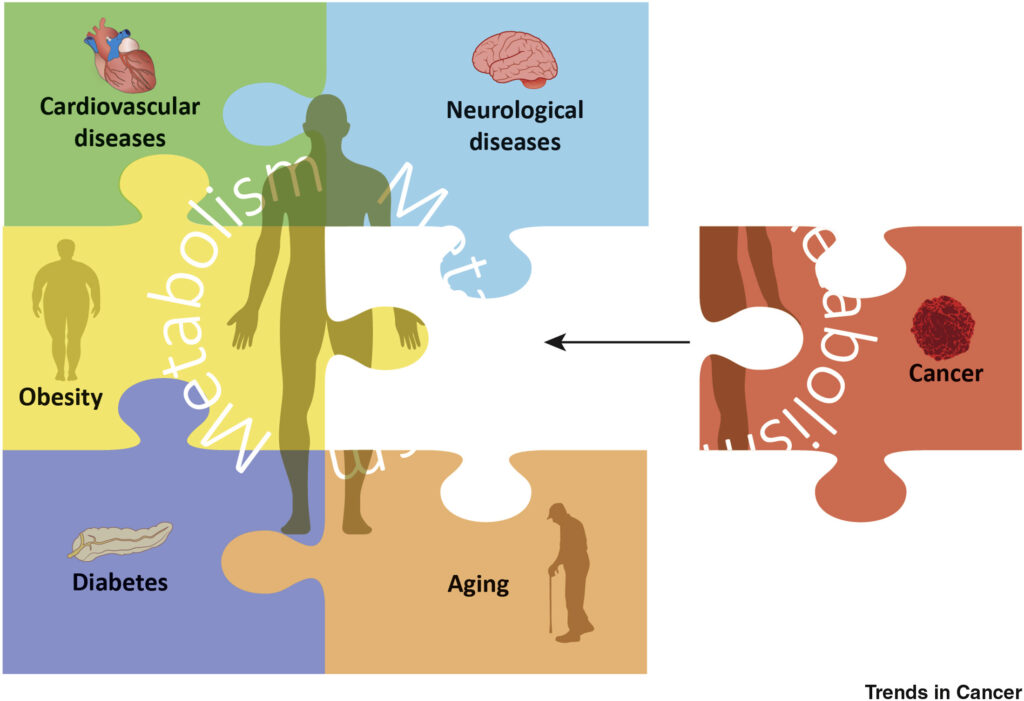Is Cancer a Metabolic Disease?
Cancer has long been assumed to be fundamentally a DNA mutational genetic cancer disease, leading to cancer cell growth. However, more and more scientists proposed a novel hypothesis: cancer is a metabolic disease. So, if you want to learn about the metabolic cause of cancer, this article is for you.
The hypothesis challenges widespread assumptions by emphasizing the crucial role of cellular energy metabolism, particularly mitochondria, in the initiation and development of cancer. This piece discusses the metabolic theory of cancer, its origin, scientific evidence supporting it, and its potential future in treating and preventing cancer.
The Traditional View: Cancer as a Genetically Inherited Disease
The hypothesis of cancer genetics has influenced oncology over the past decades. Mutation-induced transformation of the oncogene and tumor suppressor gene accounts for the normal cell to neoplastic cell transformation in this hypothesis.
The Human Genome Project and subsequent research have underscored the genetic changes that define the various cancers. But this is a limited solution. With all those decades of study and billions of dollars invested in gene-targeted therapies, survival rates for the more aggressive cancers have increased incrementally at best.
This has led scientists to question whether a strictly genetic cause is the solution.
The Metabolic Theory of Cancer: An Overview
The metabolic theory would cause one to think that cancer is not caused by genetic mutation but by abnormalities in the way cells make energy.
This is not a new idea. This is abnormal because normal cells use oxidative phosphorylation (OXPHOS) by mitochondria when oxygen is plentiful.
The Warburg Effect: A Key Clue
Otto Warburg’s discovery was revolutionary. He suggested that cancer is a result of defective mitochondrial respiration, and therefore, cells fall back on glycolysis as the powerhouse of their energy.
Though his assumptions were placed on the periphery with the development of genetic concepts, some present-day researchers have gone back to his findings in terms of recent evidence.
The glycolytic addiction of cancer cells allows them to survive in hypoxia, promotes growth rate, and facilitates immune evasion.
Mitochondrial Dysfunction and Cancer
New findings uphold the hypothesis that mitochondrial damage is a causative factor for genetic mutation in the majority of cancers. Mitochondria are not only responsible for energy production but are also engaged in cell signaling, programmed cell death (apoptosis), and regulation of reactive oxygen species.
With an abnormal mitochondrion:
- Cells have been deprived of the capacity for apoptosis, and malignant growth can be sustained
- Enhanced ROS production, providing an environment for DNA damage and mutation
- The microenvironment of the cell is acidified to permit invasion of the tumor
This metabolic cause of cancer maintains a cycle of malignancy that fuels it. This is how it continues further and spreads within the body.
Metabolic Enzymes and Tumor Growth:
Metabolic enzyme mutations also align with the metabolic hypothesis. This results in multiple changes that redirect cellular metabolism to support cancer cell growth and survival.
Genetic vs. Metabolic: First, Which?
Perhaps the biggest enigma is whether or not gene mutations are behind revved-up metabolism. Thomas Seyfried, perhaps the most vocal promoter of the metabolic theory, asserts that mitochondrial dysfunction is the culprit, and this triggers genomic instability.
He refers to experiments in which healthy nuclei are transfected into the cytoplasm of cancer cells and yet yield cancerous outcomes, implying that the environment (cytoplasm and mitochondria) rather than the nucleus is most likely at fault.
Therapeutic Implications of the Metabolic Model:
Therapies, if cancer is the offspring of metabolism, would have to target cellular energy metabolism instead of genetic mutation. Different metabolic therapies are ongoing:
1. Ketogenic Diet:
A ketogenic diet is a diet low in carbohydrates and high in fat that restricts glucose availability, starving cancer cells but nurturing normal cells on ketone bodies.
2. Hyperbaric Oxygen Therapy (HBOT):
Since cancer cells develop in oxygen-low conditions, the supply of increased levels of oxygen has been shown to stop their growth.
3. Metformin and Other Metabolic Drugs:
Applied originally to treat diabetes, metformin can be used to disrupt mitochondrial respiration in cancer cells, rendering them sensitive to conventional therapy.
4. Fasting and Caloric Restriction:
Intermittent fasting can be enhanced for chemotherapy and reduce the side effects by inducing metabolic stress on cancer cells.
This is how the metabolic cause of cancer can be treated.
Current Research and Clinical Trials:
Several clinical trials are evaluating metabolic approaches to cancer treatment. Researchers are investigating early detection using metabolic biomarkers, the intersection of immunotherapy and metabolic therapy, and creating new drugs that target metabolic enzymes.
Criticisms and Challenges:
Promising as it is, however, the metabolic theory has its detractors. Several researchers doubt that shifts in metabolism are always trailing mutations in genes, and play no causative role. And others also fear that focusing exclusively on metabolism overestimates the simplicity of cancer.
But even cynics would concede that metabolic processes play a key role in the development of cancer, and the research is one to pursue. So, do you now understand how complicated it is to find out the metabolic cause of cancer?
Merging the Two Models: An Integrated System
Rather than viewing cancer as purely genetic or metabolic, increasingly, researchers suggest a hybrid model. Metabolic illness and genetic mutation might be a synergistic feedback system. Harnessing this system might yield more efficient, targeted therapies.
A Paradigm Shift Underway?
The cancer-as-metabolic-disease hypothesis has the allure of offering a different view of which of the world’s most devastating diseases might be explained. By diverting attention away from genes and to cell energy and healthy mitochondria, we might discover new ways to prevent, diagnose, and find the metabolic cause of cancer.
Conclusion:
On an additive basis to standard therapy or a completely new therapeutic modality, metabolic therapies are promising and worth further scientific exploration.

